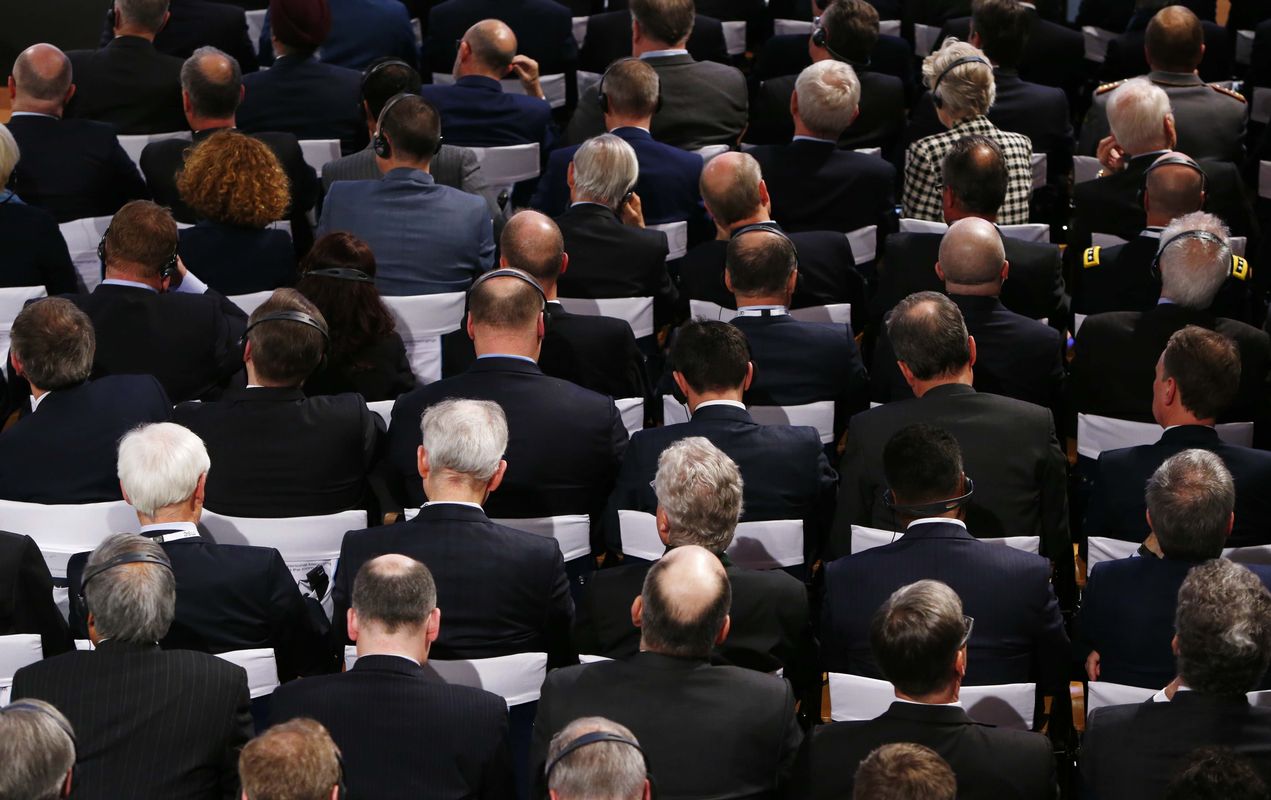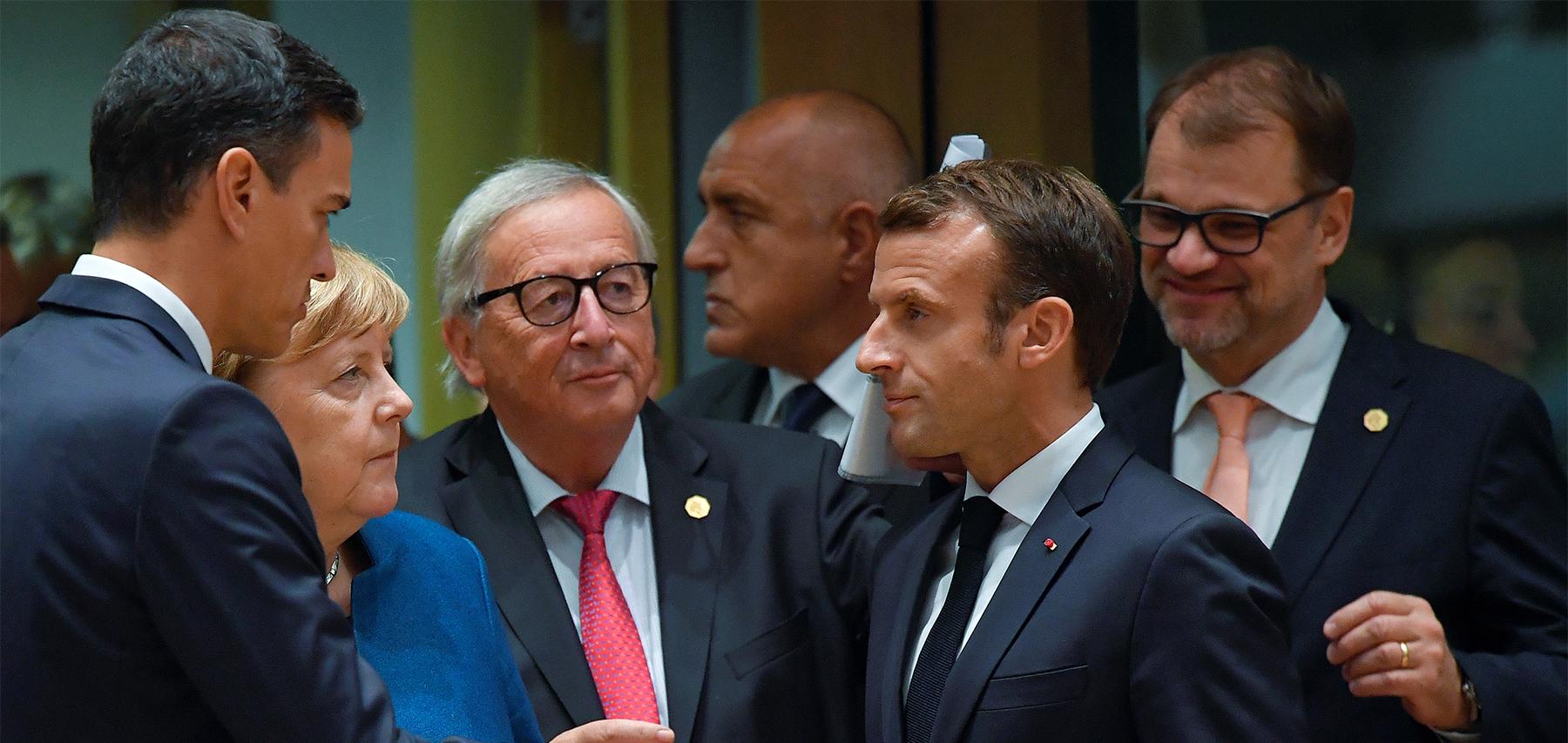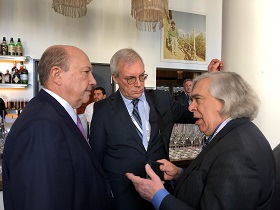With a little imagination, the annual Munich Security Conference can be presented as a big social event or royal ball in one of Alexander I’s or Louis XVIII’s European palaces.
As in any ritual honed over the course of decades, everything in Munich is important — the order of the speakers, the time allotted for each session, the status of the moderator, the language preferences of the speakers and much, much more. A significant portion of the activities takes place outside the official program and is not recorded by “uninitiated” observers.
The most anticipated speakers did not bring any real surprises. Vice President of the United States Mike Pence delivered a speech in the style of an evangelical pastor from his native Indiana, urging obstinate allies to discard their heretical doubts and follow President Trump on every single issue without exception — from counteracting Nord Stream 2 to withdrawing from the multilateral nuclear deal with Iran. The American preacher was repeatedly applauded for his eloquence, at least by the first few rows, which were made up of representatives of the United States and NATO. However, judging from the reaction of everybody else in the conference hall, most of the heretics had no interest in being told off like little children and continued to dig their heels in and hold on to their pernicious delusions. The overall impression was that the Atlantic split continued to deepen, despite the desperate attempts of the political elites on both sides of the Atlantic to halt the process.
Minister of Foreign Affairs of the Russian Federation Sergey Lavrov was restrained and concise. With his whole appearance, Lavrov demonstrated that his main aim in Munich was not just to publicly state Russia’s positions once again, but to engage in closed bilateral consultations with Russia’s main partners. Lavrov’s laconicism at the podium in Munich was compensated to a certain degree by his deputy. At the session on nuclear arms control, Deputy Minister of Foreign Affairs of the Russian Federation Sergey Ryabkov looked more convincing, in my opinion, than his counterpart, Under Secretary of State for Arms Control and International Security Affairs Andrea Thompson.
However, perhaps the most impressive speech was given by the host of the conference, Chancellor of Germany Angela Merkel. Merkel was the true queen of the Munich ball; there was even chatter on the side-lines of the event to the effect that it was the best speech of her long political career. At the 2019 Munich Security Conference, Merkel looked great. She spoke freely, rather than reading from a script, reacting in a lively manner to the audience and not shying away from difficult questions or resorting to diplomatic ambiguities. Most importantly, she touched upon what most of the people in the audience had long been waiting for. The German Chancellor unequivocally reaffirmed Germany’s candidacy for leader of Europe and, more importantly, outlined a course for Europe to achieve “strategic autonomy” from the United States.
What we can say for sure is that, right now, Russia does not have a more reliable, more predictable and more significant partner in Europe, or in the West as a whole. And this despite the fact that Angela Merkel is a difficult and uncompromising partner who is far more demanding of Moscow than, for example, her immediate predecessor Gerhard Schröder. But, as one Frenchman said many years ago, “one can rely only on that which provides resistance.”
With a little imagination, the annual Munich Security Conference can be presented as a big social event or royal ball in one of Alexander I’s or Louis XVIII’s European palaces. Just like at a grand ball, great importance is attached to details here, the invitees gossip and exchange rumours, and, on occasion, they even find solutions to extremely important problems. Why was the jumped-up gasbag Count N invited to the ball this year, while the genius and brilliant dancer Marquise NN was not? What were the well-known schemer Baron Z and the rising military General Z whispering about in the corner all that time? And, as a matter of fact, “dost thou know the lady in the crimson cap who with the Spanish envoy speaks?”
As in any ritual honed over the course of decades, everything in Munich is important — the order of the speakers, the time allotted for each session, the status of the moderator, the language preferences of the speakers and much, much more. A significant portion of the activities takes place outside the official program and is not recorded by “uninitiated” observers.
For example, even among the journalists who were present, hardly anyone paid attention to the intricate machinations that were taking place within the rather large delegation from the United States Congress. We are referring here to the search for a political successor to John McCain, that is, for someone who would replace the late Arizona senator as the informal leader of U.S. lawmakers in international affairs. It would seem that the circle of candidates has narrowed considerably, with Republican senator Lindsey Graham (one of the masterminds behind the latest package of sanctions against Russia) taking pole position. However, we will not find out the winner until the next Munich Security Conference.
Attendees at this year’s conference were wondering why such stars of previous editions as Emmanuel Macron and Theresa May were absent this time round. And why did Alexander Lukashenko and Benjamin Netanyahu get cold feet at the last minute? I was particularly disappointed by Netanyahu’s absence — his extremely moving speech, which included props (he showed part of the wreckage of an Iranian drone shot down by the Israeli Air Force), was one of the hits last year. One person who was there, however, was the Israeli Prime Minister’s eternal enemy — Minister of Foreign Affairs of Iran Mohammad Javad Zarif, who delivered a speech with his characteristic brilliance.
The most anticipated speakers did not bring any real surprises. Vice President of the United States Mike Pence delivered a speech in the style of an evangelical pastor from his native Indiana, urging obstinate allies to discard their heretical doubts and follow President Trump on every single issue without exception — from counteracting Nord Stream 2 to withdrawing from the multilateral nuclear deal with Iran. The European Union was criticized for its indecisiveness regarding Venezuela: not all of the United States’ European allies have stated their distrust of Nicolás Maduro and recognized Juan Guaidó as the country’s interim president. And China was admonished for its unfair trade practices. Pence also hinted at the impermissible behaviour of Ankara in its decision to enter into military-technical cooperation with Moscow.
The American preacher was repeatedly applauded for his eloquence, at least by the first few rows, which were made up of representatives of the United States and NATO. However, judging from the reaction of everybody else in the conference hall, most of the heretics had no interest in being told off like little children and continued to dig their heels in and hold on to their pernicious delusions. The overall impression was that the Atlantic split continued to deepen, despite the desperate attempts of the political elites on both sides of the Atlantic to halt the process.
Minister of Foreign Affairs of the Russian Federation Sergey Lavrov was restrained and concise. With his whole appearance, Lavrov demonstrated that his main aim in Munich was not just to publicly state Russia’s positions once again, but to engage in closed bilateral consultations with Russia’s main partners. Rumour has it that his meeting with his German counterpart Heiko Maas and a group of leading German businesspeople was extremely productive. All the more so, as he was joined at the meeting by such pillars of Russian business as Herman Gref and Aleksey Mordashov.
Many were eagerly awaiting the outcome of the consultations between Sergey Lavrov and Minister for Foreign Affairs of Japan Tarō Kōno. According to leaks, the two had a lively, and even stormy, discussion, although no progress in the way of concluding a peace treaty was made. Although it is worth saying here that such a meeting would not have even taken place in principle if it were not for the efforts of Vladimir Putin and Shinzō Abe.
Lavrov’s laconicism at the podium in Munich was compensated to a certain degree by his deputy. At the session on nuclear arms control, Deputy Minister of Foreign Affairs of the Russian Federation Sergey Ryabkov looked more convincing, in my opinion, than his counterpart, Under Secretary of State for Arms Control and International Security Affairs Andrea Thompson.
Russia’s standout achievement in Munich was the holding of the Primakov Readings at the conference. I cannot recall a single occasion in the past where Russia was given its own platform at the Munich Security Conference. Credit must be given here to the President of the Institute of World Economy and International Relations of the Russian Academy of Sciences Alexander Dynkin for his energy and perseverance in getting the event to happen, as well as to Wolfgang Ischinger for his political integrity in giving the Russian side such an opportunity.
However, perhaps the most impressive speech was given by the host of the conference, Chancellor of Germany Angela Merkel. Merkel was the true queen of the Munich ball; there was even chatter on the side-lines of the event to the effect that it was the best speech of her long political career. That, of course, is open to argument. I remember another rousing speech she gave at the 51st Munich Security Conference in February 2015.
At that time, Merkel had just returned from a trip to Kiev and Moscow, where she and President of France François Hollande had held exhausting negotiations with Petro Poroshenko and Vladimir Putin on how to put an end to the hostilities in Donbass. Merkel had an urgent flight to catch to Washington, where she had talks with Barack Obama, and a few days later, she was at the historic meeting in Minsk to sign the Minsk II protocols. At the 2015 conference, the German Chancellor looked extremely troubled and visibly tired, yet absolutely convinced in both the desirability and the possibility of preventing bloodshed. She had metal in her voice, the audience hung on her every word, a dead silence reigned in the conference hall and not a single person, it seemed, had any doubts about who the real leader of Europe was.
At the 2019 Munich Security Conference, Merkel looked great. She spoke freely, rather than reading from a script, reacting in a lively manner to the audience and not shying away from difficult questions or resorting to diplomatic ambiguities. Most importantly, she touched upon what most of the people in the audience had long been waiting for. The German Chancellor unequivocally reaffirmed Germany’s candidacy for leader of Europe and, more importantly, outlined a course for Europe to achieve “strategic autonomy” from the United States.
All the “red lines” were clearly marked out. Continuing the energy partnership with Moscow. Preserving the multilateral nuclear deal with Tehran. Opposing the course taken by Washington towards trade wars. Condemning the erosion of U.S.–Russia control over nuclear weapons. Adhering to the letter and spirit of the 1997 Founding Act on Mutual Relations, Cooperation and Security between NATO and the Russian Federation. Focusing on multilateralism as a fundamental principle of Germany’s foreign policy.
While the U.S. Vice President was applauded almost exclusively by those VIPs sitting in the front rows of the Hotel Bayerischer Hof conference hall, the German Chancellor’s speech was met with a prolonged ovation from everyone in the hall. Merkel deftly touched what we might call the “main” nerve of the European political process, and she said exactly what most of the people in the hall — Germans and other Europeans — had been waiting to hear.
Of course, there were also sceptics among the participants. There always are! Some were saying on the side-lines of the event that, now Merkel had left her post as leader of the Christian Democratic Union of Germany and was nearing the end of her political career, she could afford herself more liberties than she had done in the past. The suggestion was made that the Chancellor’s speech should be viewed in the context of the upcoming elections to the European Parliament in May, where the European Union’s traditional parties will face an unprecedented challenge from non-systemic nationalists and right-wing populists. Others even argued that the 2019 Munich Security Conference was the “queen’s last ball,” and her speech was not so much a program for the Chancellor’s further work as it was a political bequest to her successor.
We do not know, and perhaps Angela Merkel does not know either whether the 2019 Munich Security Conference was indeed the “queen’s last ball.” We do not know when the veteran of European politics will leave her residence in the government quarter in Spree Bend and start penning her memoirs. The question remains open as to how far Annegret Kramp-Karrenbauer or another probable successor will preserve the Chancellor’s political legacy: after all, Merkel herself was once seen as a pale and unimpressive shadow cast by the majestic figure of Helmut Kohl.
What we can say for sure is that, right now, Russia does not have a more reliable, more predictable and more significant partner in Europe, or in the West as a whole. And this despite the fact that Angela Merkel is a difficult and uncompromising partner who is far more demanding of Moscow than, for example, her immediate predecessor Gerhard Schröder. But, as one Frenchman said many years ago, “one can rely only on that which provides resistance.”
It would be wrong to prematurely place Merkel in the category of “lame duck.” On the contrary, serious progress in Europe–Russia relations, the conditions for which may appear as early as this year, would be a worthy and well-deserved finale to the long and difficult political life of one of the most prominent European statespersons of the early 21st century, Angela Dorothea Merkel.







